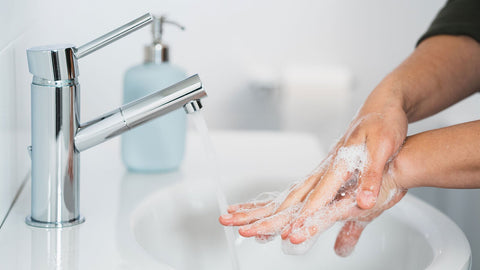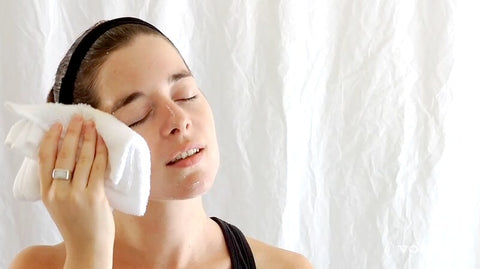
- 0 comentarios
- por Yuzuki Tsukihana
Cómo aplicar un lavado de cara natural casero con experiencia
- 0 comentarios
- por Yuzuki Tsukihana

En estos días,, el auge de el lavado facial natural casero ha llegado al centro de atención, ya que las personas tienden a preocuparse más por los efectos sostenibles y las rutinas de belleza naturales. Sin embargo, las cosas que se vuelven virales no siempre son adecuadas para todos los individuos, especialmente cuando están relacionadas con la belleza en general y el cuidado de la piel en particular.
Desplácese hacia abajo en este artículo de Japan With Love para descubrir conocimientos más profundos sobre los limpiadores faciales naturales para tener el enfoque correcto de esta tendencia y cuidar bien su piel.
En primer lugar, debemos comprender qué puede aportarnos un lavado facial japonés natural en lugar de dejarnos llevar por la exageración de los medios. Esta sección se centra en tres beneficios principales que pueden articular por qué las personas dan a este nicho del cuidado de la piel enormes preferencias.
Algunas personas podrían argumentar que cualquier otro tipo de lavado facial clasifica los productos según el tipo de piel. Sin embargo, cada categoría todavía ofrece el rango de muchas personas en lugar de personalizar los ingredientes y las fórmulas para sus preocupaciones únicas. Ahí es donde brilla el lavado facial natural casero.
Haciendo honor a su nombre, los limpiadores faciales DIY siguen recetas adaptadas a su tipo de piel y preferencias. Por lo tanto, puede estar seguro de que no habrá productos químicos o ingredientes que puedan causar irritación o alergias en su piel.
Consulte Los 5 mejores lavados faciales japoneses en espuma para una piel sana y feliz aquí para diversificar sus opciones de productos para el cuidado de la piel.

La parte de DIY satisface su necesidad de personalización, mientras que los ingredientes naturales le ofrecen un lavado facial más suave y seguro. Los limpiadores faciales caseros excluyen todos los productos químicos agresivos, como parabenos, sulfatos, triclosán, talco y fragancias, que podrían tener efectos extremos en su piel, especialmente en las sensibles.
Además, pueden evitar que su piel se debilite y se dañe debido al uso prolongado de productos químicos fuertes en los lavados faciales industriales. Este tipo de lavado facial utiliza principalmente ingredientes de fuentes naturales, como hierbas, para calmar su piel y eliminar suavemente toda la suciedad sin eliminar el sebo esencial.
El uso de lavados faciales orgánicos y naturales puede ayudar significativamente a reducir la cantidad de envases de plástico y el consumo de materiales tóxicos, como el paraben y el sulfato. Por lo tanto, puede generar efectos positivos en nuestro medio ambiente.
Aunque el proceso de aplicación no es diferente, hay algunos aspectos y consejos relacionados que debe conocer para aprovechar al máximo este enfoque natural para el cuidado de su piel. Aquí está el recorrido de cómo debe aplicar un lavado facial casero.

El primer paso es limpiar sus manos para eliminar las bacterias potenciales que pueden causar efectos inesperados o alergias. El consejo adicional es humedecer su cara con agua tibia antes de aplicar el lavado facial, ya que puede suavizar la suciedad y las impurezas; por lo tanto, la eliminación de la suciedad se vuelve mucho más fácil.

El siguiente paso es aplicar una cantidad del tamaño de una moneda de diez centavos de lavado facial en las yemas de los dedos. Tal cantidad es suficiente para tener efectos positivos en su cara, ya que usar demasiado puede despojar a su piel de los aceites naturales esenciales.
Al masajear su cara con el limpiador, debe hacer movimientos circulares y concentrarse en las áreas propensas a la grasa, como la frente, la nariz y la barbilla. Tenga cuidado con su ojo dedicado, ya que la piel allí es más delgada y más propensa a la irritación.
Después de unos 30 segundos, debe enjuagar su cara a fondo con agua tibia para eliminar todos los rastros del limpiador. Recuerde no usar agua demasiado caliente para enjuagar la cara, ya que puede resecar su piel.
Consulte Limpiador espumoso Dove Botanical Selection (Resplandor Natural) 145 ml - Limpiador espumoso japonés para diversificar sus opciones de cuidado de la piel.

Producto relacionado: Espuma limpiadora Hatomugi W 130g
Este paso no es menos crucial que el paso de la aplicación, que no muchas personas reconocen. No frote su cara bruscamente, sino que dé golpecitos suaves en su cara con una toalla limpia y suave hasta que esté seca. También debe prestar atención a los materiales de su toalla, si causan alguna irritación o alergia en su piel.
Cuando la cara esté seca, debe aplicar una crema hidratante adecuada para su tipo de piel para reponer la hidratación. Ayudará a mantener una barrera cutánea saludable que puede ralentizar el proceso de envejecimiento.
Si desea tener un papel más activo en el cuidado de su piel, la guía sobre cómo hacer un lavado facial natural a continuación formará una base sólida.
Los conocimientos sobre su tipo de piel, ya sea seca, grasa, sensible o mixta, son vitales para determinar qué ingredientes deben estar en su limpiador facial DIY. Por ejemplo, la arcilla (bentonita y caolín) y el té verde se recomiendan para la piel grasa, mientras que el aceite de jojoba, aguacate y manteca de karité son las mejores opciones para la piel seca. En este sentido, realizar una investigación profunda y consultar a expertos debe ser su prioridad en el proceso.
Existe una amplia información sobre una receta DIY de limpiador facial natural para su referencia y preferencias. Compartiremos aquí tres regímenes populares con procesos simples e ingredientes fáciles de encontrar.

Después de elegir la receta adecuada para hacer su propio lavado facial, es hora de mezclar los ingredientes con la cantidad sugerida en la receta. Después de que la mezcla esté lista, no debe aplicarla en su cara inmediatamente, sino probarla en un área pequeña de la parte interna de su brazo durante 24 horas para verificar si hay reacciones alérgicas.
Si todo va bien, puede comenzar a usar su limpiador facial DIY. Si no, debe cambiar la receta o solicitar una consulta experta.
Descargo de responsabilidad: la información aquí es solo para fines educativos y no debe percibirse como un consejo médico. La mejor opción es consultar a un dermatólogo antes de comenzar cualquier nuevo régimen de cuidado de la piel, especialmente si tiene alguna afección cutánea subyacente.
Consiga esto ahora:🌟 Jabón de lavado facial Natural Comfortable Sake Lees de Cow Brand 80 g - Barra de jabón limpiador facial

Sí, lo es. El limpiador facial puede satisfacer su propósito de limpiar la piel con un enfoque más suave mediante el uso de ingredientes naturales en lugar de productos químicos agresivos. Sin embargo, la efectividad solo es obvia si todo coincide con su tipo de piel, como la receta que elija, la forma en que aplique y cómo almacene el limpiador.
Además de hacer lavados faciales DIY, aún puede usar productos probados de lavado facial japonés, ya que también usan ingredientes naturales para una limpieza más suave sin eliminar todos los aceites cruciales de su piel.
Puede mezclar todos los ingredientes siguiendo la receta y almacenar la mezcla en un recipiente hermético en un lugar seco y fresco. El mejor consejo es hacer lotes más pequeños para un uso más fresco y un mejor almacenamiento debido a la falta de conservantes. Otra forma es almacenar sus materiales frescos y mezclarlos justo antes de su lavado facial.
Algunos lavados faciales recomendados que van directamente a la cima son el limpiador Hatomugi y el limpiador SK II. Hay muchas recomendaciones excelentes en el mercado a precios económicos. El mejor consejo es mirar sus ingredientes que provienen principalmente de hierbas o fuentes botánicas y no deben incluir productos químicos agresivos como sulfato, alcohol y paraben.
Esperamos que el recorrido completo del lavado facial natural casero le haya proporcionado información útil y recomendaciones prácticas sobre recetas, guías de aplicación y consejos adicionales. Siga a Japan With Love para explorar información más actualizada sobre consejos de belleza y productos increíbles para el cuidado de la piel.
Compartir:
Cómo hacer maquillaje Kawaii: Una guía paso a paso para un perfecto
Cómo usar el cortaúñas en casa: un tutorial paso a paso